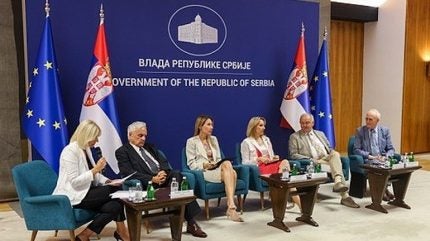
Serbia, which seeks energy independence and an end to the use of fossil fuels, has lifted a moratorium on the construction of NPPs after 35 years. Serbia’s Parliament has adopted amendments to the Energy Law ending the ban, introduced in the former Yugoslavia in 1989, three years after the Chernobyl nuclear disaster. Authorities then suspended the nuclear programme and shut down the only research reactor in Belgrade.
The amendments to the Energy Law ensure greater energy security for Serbia in its transition to clean energy, harmonise the local regulatory framework with the EU regulatory framework, and develop the functioning of the energy system. Part of the law refers to Serbia’s Nuclear Energy Development Programme, which comprises three phases a feasibility study, programme development, and implementation.
The Minister of Mining & Energy, Dubravka Dedovic Handanovic, described the parliament’s decision as a “very important day for energy in the Republic of Serbia”, which currently relies on its natural resources, particularly coal, for nearly 70% of its electricity production. Serbia, a candidate for European Union membership, has pledged to abandon coal by 2050. To achieve this, the government has been exploring alternative energy sources for several years, with nuclear power leading the options under consideration.
The lifting of the moratorium follows a national consultation process led by Dedovic Handanovic, which addressed the legislative and technical issues needed to adapt the regulatory framework for this transition. “After 35 years, the moratorium on the construction of nuclear power plants has been lifted,” she commented on social media, adding: “History was written today.”
In July, five Serbian ministries and 20 academic institutions and state energy companies signed a memorandum of understanding on nuclear energy development. The Ministries included: Mining & Energy; Science, Technological Development & Innovation; Education; Environmental Protection; and Health. Djedovic Handanovic said after signing that it should “enable the gathering of experts from the country and abroad who will work on examining the possibility of establishing a programme for the peaceful application of nuclear energy in Serbia”.
She added: “The topic of energy supply is a matter of both energy and national security, and that is why it is important to consider all the facts in a professional and committed manner and not to skip a single step on the way, because we have no room for mistakes”, according to the ministry’s press release.
The signing was part of a panel discussion entitled Nuclear energy from the past to the future, which the Ministry labelled as “beginning of the public debate” on using nuclear energy in Serbia. The Ministry in June had called for preparation of a preliminary technical study to consider the peacetime application of nuclear energy in Serbia.
Djedovic Handanovic said this “should provide a comparative analysis of available technologies on the market, show the advantages and disadvantages of possible solutions and the technical, economic and market parameters for the construction of nuclear power plants”.
Prime Minister Milos Vucevic, who attended the event, said: “We are going back to that moment when we gave up something that we shouldn’t have given up, we are going in the direction of a well-developed and organised world”.
In March, President Aleksandar Vučić announced that Serbian legislation would be changed in a speech to the International Atomic Energy Agency nuclear energy summit in Brussels. He said Serbia has “three problems”, one of which is a lack of know-how on nuclear energy and the second is money. “Number three … is we will always need to get a change of mindset in our people, which is not easy, but we are ready to do it, which means we will not only adjust but will have to change the overall legislative framework, and we will do it.”
Vučić subsequently commented that Serbia needs four small modular nuclear reactors, as the country will use four times more energy by 2050 than it does now. He was cited by Tanjug as saying Serbia “has neither the knowledge nor the money for classical nuclear power plants, which cost between €11bn ($11.6bn) and €13bn”.
In August, during French President Emmanuel Macron’s visit to Belgrade, an agreement was signed between the two countries in the field of peaceful uses of nuclear energy in Serbia. In September, the
Ministry of Mining & Energy awarded a contract for a preliminary technical study of the potential use of civil nuclear power in Serbia to Electricite de France (EDF) and French engineering consultancy Egis Industries. EDF and Egis offered to conduct the study for €120,000, excluding value-added tax, the Ministry said.
The Ministry had issued the public procurement order in June for the study. It delayed the deadline by two weeks and opened the bids in early August. EDF and Egis won the most points. Their bid almost matched the government’s estimate. Eight other companies and groups of bidders participated in the tender.
These included: China National Nuclear Corporation Overseas; Jooho Whang – Powertos (the bid was declared invalid); Nikola Tesla Institute of Electrical Engineering – Enconet Consulting; Environ – GO2Power; Sargent and Lundy; Tenet Advisors – JSC KEPT; NAC International – MRC Arge Enerji Mühendisliği, Kontrol ve Test Hizmetleri; and SC Romcapital Invest – UJV REŽ – EKS.
EDF and Egis need to list options and recommend solutions. The preliminary technical study is expected to present available technologies and to recommend the solutions. The analysis needs to cover conventional, generation 3+ NPPs, as well as more advanced technologies such as small modular reactors but should not include Generation 4 reactors.
Serbia is also considering energy co-operation with Hungary. On a recent visit by Vučić to Budapest, he announced that he had discussed with Hungarian Prime Minister Viktor Orban the possibility of Serbia acquiring 5 to 10% of Hungary’s Paks NPP.






